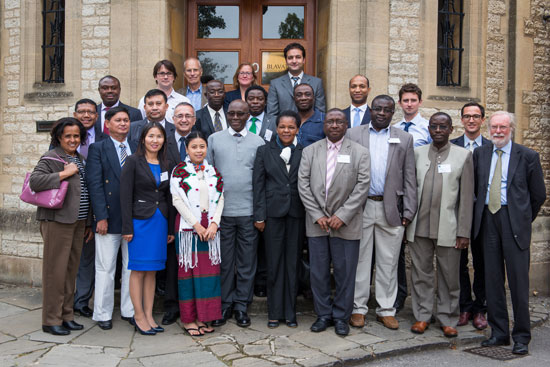
From Yangon to Oxford, Lessons in Resource Governance: Q&A With Soe Nandar Linn
In resource-rich countries around the world, senior-level policymakers face difficult extractive sector decisions—from how to attract investors and manage revenues to how to engage citizens and protect the environment. In developing countries in particular, such decisions must be made carefully, as they have the potential to transform societies for development, or conversely, propagate corruption, waste and poverty.
Soe Nandar Linn, a researcher from Myanmar, sees a clear path for her country, which recently took steps to join the Extractive Industries Transparency Initiative (EITI), despite the challenges associated with “opening up.” (See “High Hopes, High Barriers: Can Myanmar Find Its Way With EITI?”) Last month she traveled 5,000 miles (8,500 km) to England to attend an executive course on oil, gas and mining governance, organized by the Natural Resource Governance Institute (NRGI) and the University of Oxford's Blavatnik School of Government. There she joined fellow policy-makers from eight different countries for six days of discussion, instruction and policy work using NRGI's Natural Resource Charter as a guiding framework.

In the conversation that follows, Nandar spoke with NRGI’s Helen Dempsey about what she learned, and about what lies ahead on Myanmar’s long but promising road to better resource governance.
What was the most useful thing you learned from the instructors?
The sessions on non-fiscal opportunities and taxing extraction companies are directly useful for my work. I have to prepare policy papers on state-owned enterprise reform and natural resource funds for the upcoming Natural Resource Governance Conference, when Myanmar hosts the EITI board meeting [in mid October]. It is important to highlight non-fiscal opportunities for negotiations among state-owned companies, international companies and citizens.
Additionally, we do not yet have a proper taxation mechanism for extraction companies. Thus, I have planned to prepare a policy brief on international best practices for Myanmar. The Ministry of Mines wants to know about this issue specifically.
What was the most useful thing you learned from participants from other countries?
Currently, I am assisting the Ministry of Finance with an equalization fund at the sub-national level, based on geographical information. But as I learned from the representatives of Ethiopia, it is possible to manage sub-national work and allocate resources along ethnic lines rather than geographic lines. Like Ethiopia, Myanmar is an ethnically diverse country. Our ethnic leaders and government leaders need to find an agreeable resource allocation mechanism, which is crucial for the sustainable peace in the country.
How is Myanmar different from the other countries represented, in terms of resource governance issues?
Myanmar is still the poorest in resource governance, as ranked among 58 countries studied by NRGI. [See the Resource Governance Index.] Now that we have become an EITI candidate country, I hope that we can encourage the government of Myanmar to be more transparent in resource sector management. I recently co-authored an article to that effect.
Will this course help inform the new EITI process in Myanmar or better prepare the country to host EITI meetings in October?
The whole course is valuable and useful for Myanmar's EITI process. First of all, we do not have many human resources working on resource sector governance, due to our mismanaged education system. I am preparing resource-sharing models, extractive state-owned economic enterprises reform and resource revenue utilization models for the EITI board meeting. Thus, the reading materials and lecture notes I took from the Executive Course on Oil, Gas, and Mining Governance are useful for me.
Soe Nandar Linn is a research associate at the Myanmar Development Resource Institute’s Centre for Economic and Social Development. She is also the program coordinator of the Myanmar Extractive Industries Transparency Initiative.